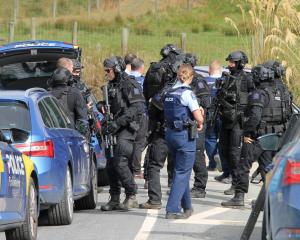
Perplexed by the paucity of trains carrying people, Dr Connors may soon embark on a speaking tour.
The track was not unsuitable for faster trains, New Zealand was not a poor, debt-ridden country, and the population base between Christchurch and Dunedin was not insufficient for a restored passenger service, he told an audience at the Maggies cafe in Dunedin on Saturday.
"We are cursed by the cult of tight-fistedness", he said.
Dr Connors is a senior lecturer at the Otago Business School, but said he was speaking in a private capacity, rather than representing the University of Otago.
Commentary was nonetheless based on his research, he said.
A poster for his talk showed a Japanese Kiha 261 diesel railcar, which could travel at a constant 130kmh by tilting into corners and it ran on the same narrow track as used in New Zealand.
His vision — perhaps not one all rail advocates would support — was to "cut the romanticism" attached to train trips and get a lot of people into cheap railcars.
Dr Connors said rail enthusiasts needed to get better at articulating why change was required, and this went beyond environmental imperatives and arguments about the public good.
"Any subsidy for passenger rail will reap reward in economic benefits", he said.
Other parts of the world had made train services work, he said.
His observations were mixed in with scepticism of hydrogen technology being an environmental silver bullet, and simplistic characterisations of political leaders.
Dr Connors described an investment bias to Auckland and Wellington, and lack of incentive to show much genuine interest in other parts of the country.
"The problem is the votes are in Auckland", he said.
"If politicians cared, they would mention the South Island now and then."
The South Island, Hawke’s Bay and Taranaki helped the national economy through exports and were in a position to ask the government "where’s our money?", he said.
Dr Connors also had reservations about the government scrapping an upgrade of Cook Strait ferries and priorities identified for land transport funding in a draft document.
Two of 15 "roads of national significance" in line for funding were in the South Island.
None were in Otago or Southland.
Minister of Transport Simeon Brown said last week the draft government policy statement would bring a change of focus, "realigning transport expenditure to better support economic growth, and to ensure all New Zealanders are provided with a well maintained and reliable transport network".
"We also recognise the importance of local and rural roads in connecting our communities and businesses to key routes, and the importance of ensuring the whole network is maintained to a reliable standard."
Consultation on the government’s draft statement closes on April 2.
The public has a few more days to make submissions about regional land transport priorities for 2024-2027.
Consultation on the pitch from Otago and Southland for national funding finishes on Friday.
Copies of the consultation documents can be downloaded from the Otago Regional Council and Environment Southland websites.
West Harbour Community Board member Jarrod Hodson said the two biggest cities in the South Island lacking a passenger rail connection between them was strange.
He noted he could take a train from Auckland to Wellington and then Picton to Christchurch, but not on to Dunedin.












